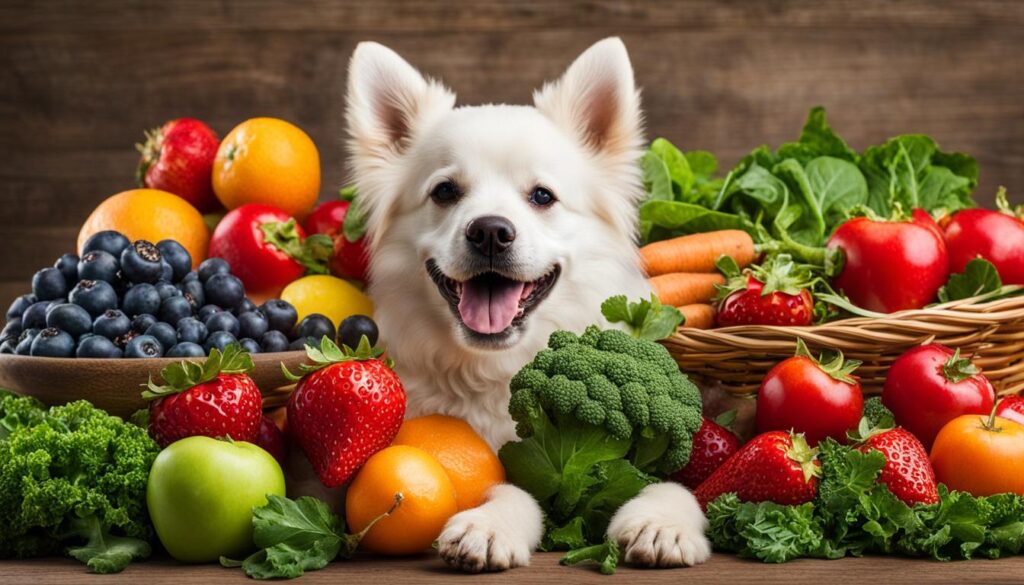Welcome to our article on the important role of fiber in your dog’s diet. As a responsible pet owner, it’s crucial to understand the benefits of including fiber in your furry friend’s meals. Fiber plays a significant role in promoting overall health and well-being for your dog, offering a range of advantages for their digestive system and weight management.
When it comes to fiber, there are two types: soluble and insoluble. Soluble fiber acts as food for the good bacteria in your dog’s colon, aiding digestion and promoting a healthy gut. Insoluble fiber, on the other hand, adds bulk to the stool, leading to regular bowel movements and a feeling of fullness.
Providing your dog with the right amount of fiber is essential, but be careful not to overdo it. Too much fiber can have adverse effects like weight loss, flatulence, bloating, diarrhea, and vomiting. Consult with your veterinarian to determine the ideal fiber intake for your dog’s individual needs.
Key Takeaways:
- Fiber plays a critical role in a dog’s diet, benefiting their overall health.
- There are two types of fiber: soluble and insoluble.
- Soluble fiber promotes digestion, while insoluble fiber adds bulk to the stool.
- It’s important to provide the right amount of fiber and avoid overfeeding.
- Consulting with a vet is recommended before making any dietary changes.
Different Types of Fiber Dogs Need
When it comes to a dog’s diet, fiber plays a crucial role in promoting overall health and well-being. Dogs require both soluble and insoluble fiber, each with its own unique benefits. Soluble fiber, as the name suggests, dissolves in water and aids in digestion by serving as food for the good bacteria in the colon. This promotes a healthy gut and optimal digestive function. On the other hand, insoluble fiber adds bulk to the stool, promoting regularity and a feeling of fullness. It helps prevent constipation and supports weight management by reducing hunger and cravings.
The key to a healthy fiber intake for dogs is striking a balance between soluble and insoluble fiber. This ensures that they can enjoy the full benefits of a fibrous diet. Soluble fiber helps nourish the gut microbiome, supporting digestive health, while insoluble fiber promotes regular bowel movements and provides a sense of satiety. Incorporating both types of fiber into a dog’s diet can contribute to their overall well-being and digestive efficiency.
Below is a table outlining the main differences between soluble and insoluble fiber:
| Fiber Type | Main Characteristics | Benefits |
|---|---|---|
| Soluble Fiber | Dissolves in water | Promotes good bacteria growth, aids digestion |
| Insoluble Fiber | Does not dissolve in water | Adds bulk to stool, promotes regularity, provides a feeling of fullness |
By understanding the different types of fiber and their respective benefits, you can ensure that your dog’s diet includes a balanced mix of both soluble and insoluble fiber. Providing them with the right amount of fiber can contribute to their digestive health, weight management, and overall well-being.
Fiber’s Role in Digestive Health
Fiber plays a crucial role in maintaining good digestive health in dogs. By promoting bowel regularity and preventing constipation, fiber helps keep your furry friend’s digestive system running smoothly. Additionally, fiber can help manage diarrhea and loose stools by absorbing excess water in the intestines. It acts as a natural bulking agent, adding volume to the stool and reducing the risk of anal gland inflammation. Overall, fiber contributes to optimal digestive well-being and ensures that your dog’s gastrointestinal system stays healthy and functional.
The Benefits of Fiber for Digestive Health
When it comes to digestive health, fiber offers several benefits for dogs:
- Regulates bowel movements: Fiber helps regulate the frequency and consistency of bowel movements, preventing both constipation and diarrhea.
- Prevents anal gland issues: Adequate fiber intake ensures that the stool has sufficient bulk, reducing the risk of anal gland problems, such as impactions or infections.
- Supports colon health: Fiber acts as a prebiotic, providing nourishment to beneficial gut bacteria in the colon. This helps maintain a healthy balance of gut flora, essential for optimal digestion.
- Aids in weight management: High-fiber diets can help dogs feel fuller for longer, reducing excessive food consumption and aiding in weight management.
Incorporating fiber into your dog’s diet is relatively simple. There are various natural sources of fiber, including vegetables such as Brussels sprouts, broccoli, carrots, and green beans. These can be incorporated into your dog’s meals or offered as healthy, fiber-rich treats. However, it’s important to consult with your veterinarian to determine the appropriate amount of fiber for your dog’s specific needs. Excessive fiber intake can lead to digestive upset, including flatulence, bloating, diarrhea, and vomiting. Your vet can guide you in finding the right balance to optimize your dog’s digestive health.

Fiber for Weight Management and Preventing Dog Obesity
Fiber plays a crucial role in helping dogs maintain a healthy weight and preventing obesity. By providing a feeling of fullness without adding excessive calories, fiber helps dogs stay satisfied while consuming fewer calories. This can contribute to weight loss in overweight dogs or prevent weight gain in dogs at a healthy weight.
Insoluble fiber, in particular, adds bulk to the diet, reducing hunger and cravings. By taking up space in the stomach that could otherwise be occupied by fats and carbohydrates, high fiber diets tend to be lower in calories. This can be especially beneficial for dogs that have a tendency to overeat or struggle with portion control.
However, it’s important to find the right balance when incorporating fiber into a dog’s diet. Excessive amounts of fiber can lead to undesirable side effects such as weight loss, flatulence, bloating, diarrhea, and vomiting. It’s essential to consult with a veterinarian to determine the appropriate amount of fiber for your dog’s individual needs.
Fiber’s Role in Weight Management
High fiber diets can help dogs manage their weight by:
- Providing a feeling of fullness, reducing the urge to overeat
- Adding volume to the diet without adding excessive calories
- Helping dogs maintain a healthy digestive system and regular bowel movements
- Assisting in weight loss when combined with a controlled calorie intake
While fiber is beneficial for weight management in dogs, it’s important to remember that it’s just one aspect of a healthy diet. Regular exercise, portion control, and a balanced nutrition plan tailored to your dog’s specific needs are also essential for maintaining optimal weight and overall well-being.
| Fiber-Rich Foods for Dogs | Fiber Content per 100g |
|---|---|
| Broccoli | 2.6g |
| Brussels Sprouts | 3.8g |
| Carrots | 2.8g |
| Green Beans | 3.0g |
Including fiber-rich foods in your dog’s diet can be a great way to promote weight management. Vegetables like broccoli, Brussels sprouts, carrots, and green beans are all excellent sources of fiber. You can serve them cooked or raw, but always make sure to prepare them in a way that is safe and appropriate for your dog’s digestion.
Remember, fiber is just one piece of the puzzle when it comes to weight management in dogs. Consulting with a veterinarian and developing a comprehensive plan that includes appropriate exercise, portion control, and a balanced diet is essential for helping your furry friend maintain a healthy weight.

The Benefits of Natural Fiber Sources
“Including natural fiber sources in your dog’s diet can provide numerous benefits for their digestive health. Fiber helps regulate bowel movements, preventing constipation and promoting a healthy gut. It also contributes to weight management by providing a feeling of fullness without adding many calories. So, don’t forget to incorporate these fiber-rich options into your dog’s meals and snacks!”
A Complete Table of Fiber-Rich Vegetables for Dogs
| Vegetable | Fiber Content (per 100g) |
|---|---|
| Brussels Sprouts | 3.8g |
| Broccoli | 2.6g |
| Carrots | 2.8g |
| Green Beans | 3.2g |
Table: Fiber content of selected vegetables commonly used in dog diets.
Conclusion
Fiber is a crucial component of your dog’s diet, providing a range of health benefits such as improved digestion, weight management, and bowel regularity. It’s important to ensure that your furry friend gets a balanced mix of soluble and insoluble fiber for optimal overall well-being. While most commercial dog foods contain some fiber, you can enhance your dog’s fiber intake by incorporating fresh foods and fiber-rich treats into their diet.
However, it’s important to avoid exceeding the recommended amount of fiber. Too much fiber can have adverse effects such as weight loss, bloating, and diarrhea. To determine the right amount of fiber for your dog’s individual needs, consulting with a veterinarian is advisable.
In some cases, fiber supplements for dogs may be considered. These supplements can provide an extra boost of fiber or can be beneficial for specific health conditions. Before incorporating any supplements into your dog’s diet, it’s always best to consult with your veterinarian to ensure it aligns with their unique needs.
By paying attention to your dog’s fiber intake and making necessary adjustments, you can contribute to their overall well-being and digestive health. So, remember to prioritize fiber in your dog’s diet to keep them happy and healthy!
FAQ
What is the role of fiber in a dog’s diet?
Fiber plays a crucial role in a dog’s diet, providing various benefits for their overall health. It aids in digestion, promotes regularity, and helps maintain colon health.
What are the different types of fiber that dogs need?
Dogs require both soluble and insoluble fiber in their diets. Soluble fiber feeds the good bacteria in the colon, while insoluble fiber adds bulk to the stool and promotes fullness.
How does fiber contribute to digestive health in dogs?
Fiber regulates bowel movements, prevents constipation, and helps manage diarrhea. It also reduces the risk of anal gland inflammation and contributes to overall digestive well-being.
Can fiber help with weight management in dogs?
Yes, fiber provides a feeling of fullness without adding many calories, aiding in weight management. It reduces hunger and cravings and can assist in weight loss or preventing obesity.
What are some natural sources of fiber for dogs?
Dogs can get fiber from fiber-rich vegetables like Brussels sprouts, broccoli, carrots, and green beans. There are also fiber-rich treats available to supplement their diet.
Should I consult with a veterinarian before changing my dog’s fiber intake?
Yes, it’s recommended to consult with a vet before making any dietary changes, especially when it comes to fiber intake. They can provide guidance specific to your dog’s individual needs.





